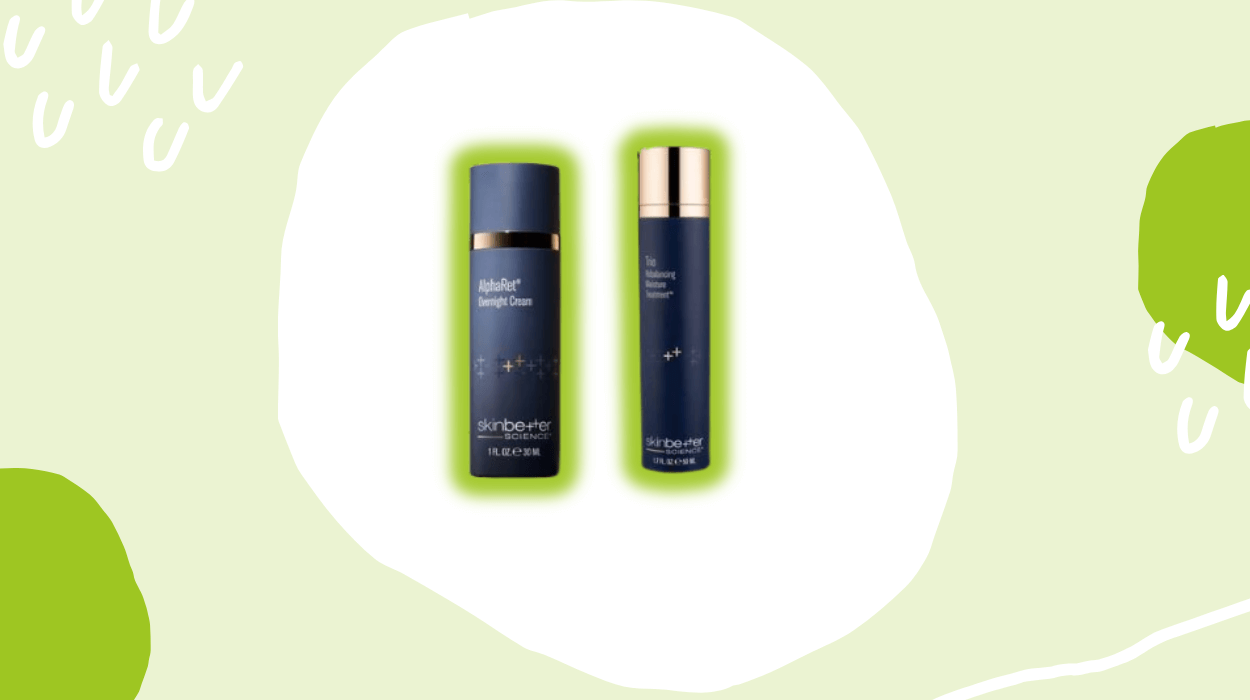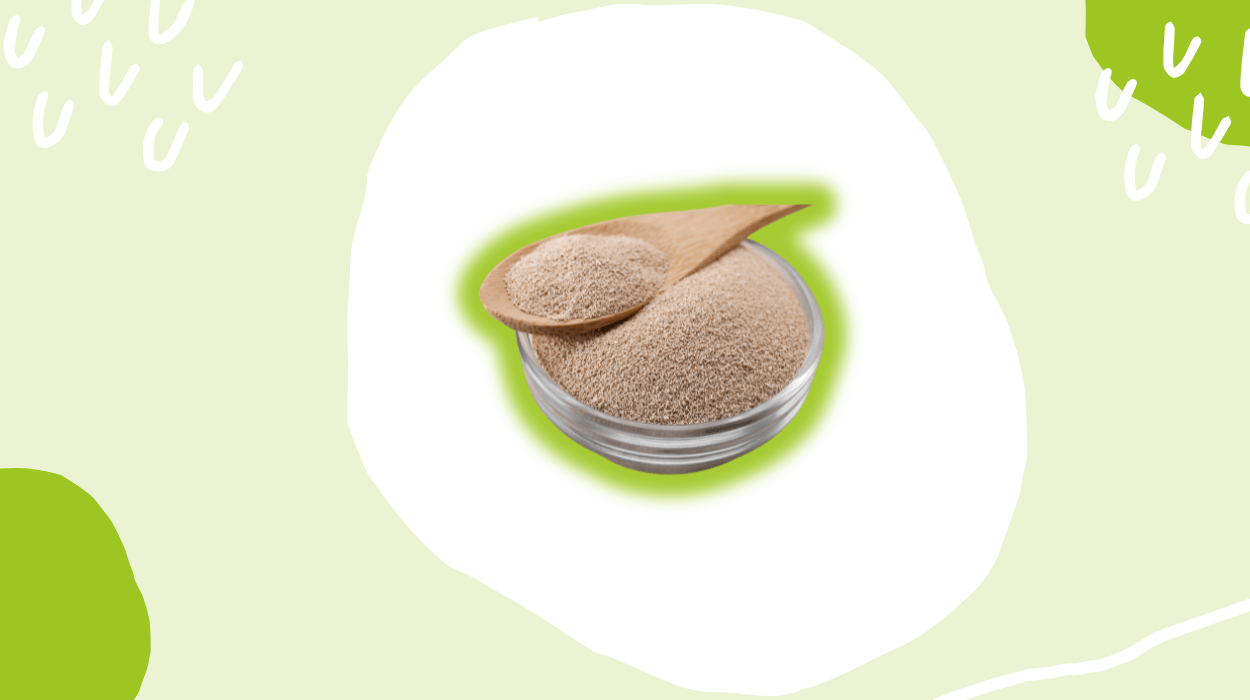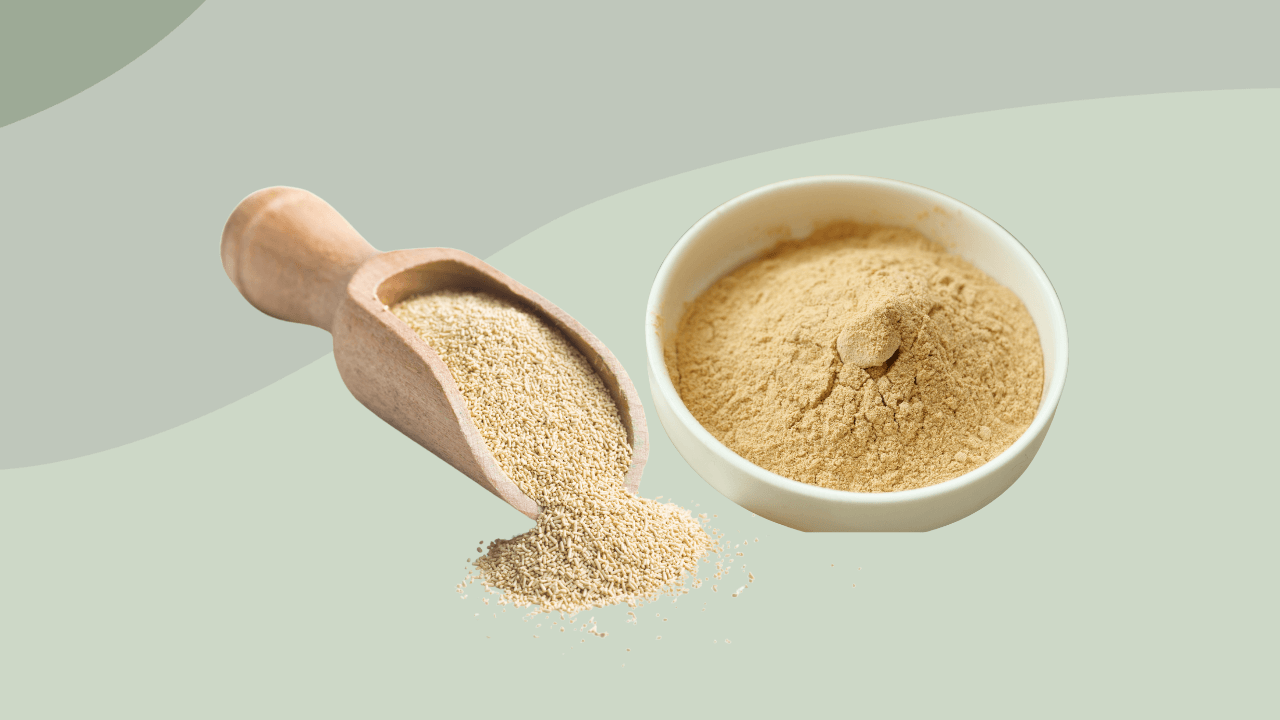

Nutritional yeast may provide a plant-based source of nine essential amino acids, which may help support muscle repair, growth, and recovery. Though nutritional yeast does not contain live microorganisms (such as in probiotics), it has prebiotic properties that may support digestion and gut microbiome balance.
Nutritional yeast also provides iron and zinc, which could support your immune system and help combat fatigue. It could blend easily into soups, salads, popcorn, and other savory dishes, making it a convenient addition to your dietary routine.
This article explores the benefits of nutritional yeast, including its function, benefits, and nutritional composition. It also discusses some considerations and potential side effects of nutritional yeast.
Nutritional yeast is known as a deactivated form of yeast, typically the species Saccharomyces cerevisiae. It is usually cultivated on a sugar-rich medium such as molasses, harvested, and heated to deactivate the yeast cells. Afterwards, it is dried into yellow flakes, granules, or powder. Nutritional yeast is naturally savory, which may come off as cheesy or nutty.
The flavor comes from the combination of amino acids, nucleotides, and compounds like succinic acid and aldehydes, produced during its fermentation process.
Nutritional yeast generally comes in fortified and unfortified variants. Fortified varieties contain added vitamins/minerals after the yeast is harvested (particularly vitamin B12 and other B-complex vitamins) to boost nutrient content.
Unfortified nutritional yeast contains only the vitamins, minerals, and amino acids naturally produced during the yeast’s growth, offering a more minimal, additive-free option.
Because of its umami taste, nutritional yeast is a popular seasoning in plant-based and vegan recipes, often used as a cheese substitute in sauces, dressings, and snacks. Nutritional yeast may help support energy production, metabolism, and immune function.

According to the USDA, a 100-gram serving of nutritional yeast (branded) features 400 calories, 60g of protein, 20g of dietary fiber, 4,700µg of folic acid, and 6mg of iron. It also contains other nutrients, including 2,200mg of potassium, 200mg of sodium, 64mg of riboflavin, 350mg of niacin, 72mg of vitamin B6, and 150µg of vitamin B12.
The dietary fibers in nutritional yeast are mostly in the form of beta-glucans and mannan, which may help support digestion, promote satiety, and contribute to healthy gut function.
B-complex vitamins (such as folic acid and vitamins B6 and B12) may support energy metabolism, red blood cell production, and nervous system health.
Potassium in nutritional yeast may help support fluid balance, nerve signaling, and muscle contractions. It is also important to note that nutritional yeast does not contain cholesterol or sugars.
Nutritional yeast may fuel your body with a concentrated mix of nutrients that are ready for quick absorption and use. It comes from a single-celled organism called Saccharomyces cerevisiae, which is deactivated with heat.
Once consumed, your digestive system breaks these nutrients down into smaller, active forms, like amino acids from protein and vitamin forms such as B12 and riboflavin. Inside your body, the B vitamins in nutritional yeast take center stage in metabolism.
For example, vitamin B12 may act as a coenzyme in processes that synthesize DNA and support nerve cell functioning. Your body converts niacin and riboflavin into NAD/NADP and FAD, two molecules that your bodily cells use to extract energy from carbohydrates, fats, and proteins.
Nutritional yeast also has alpha-mannan, which may help support a healthy balance of gut bacteria, thereby contributing to your immune defenses. It may also benefit heart health by lowering cholesterol levels, particularly LDL (bad) cholesterol levels.
Moreover, nutritional yeast contains antioxidants like glutathione and selenomethionine, which may protect bodily cells from damage caused by free radicals and reduce inflammation. These antioxidants might potentially help lower the chance of developing chronic issues like diabetes and heart disease over time.
Nutritional yeast utilizes beta-glucans (a type of soluble fiber) to support immunity. These fibers may activate immune cells, such as macrophages, natural killer (NK) cells, and neutrophils. Such activation may help your body’s immune system to detect and eliminate harmful pathogens before they trigger illness.
Selenium in nutritional yeast might promote your body’s antioxidant defenses through special proteins called selenoproteins, which may protect immune cells from excessive damage caused by free radicals. With improved immunity, you may recover faster from illnesses, experience fewer infections, and maintain better energy levels. It may also boost your body’s resilience against colds or flu.
Nutritional yeast contains vitamin B7, which could support the production of keratin, a structural protein that may support hair strength, nail firmness, and shield your skin’s protective barrier.
Riboflavin in nutritional yeast may support collagen production and help your cells repair themselves, which could support skin firmness and elasticity. The amino acids in nutritional yeast may give your body the raw materials to build protein-rich tissues, including the hair strands and nails.
Nutritional yeast might help boost your energy levels by providing essential B vitamins. These vitamins may help your cells metabolize carbohydrates, fats, and proteins into adenosine triphosphate (ATP), the main energy currency your body runs on.
Riboflavin and niacin are constituents of molecules called FAD and NAD⁺, which are central to the mitochondrial electron transport chain, where most of your ATP is made. When these processes are optimized, you may experience steadier energy levels throughout the day. It could help you stay productive, support physical performance, and minimize fatigue.
Nutritional yeast may promote digestive health by providing both insoluble and soluble fiber. Beta-glucans and mannan-oligosaccharidesInsoluble in nutritional yeast may function as prebiotics, encouraging the growth of helpful bacterial strains like Bifidobacterium and Lactobacillus. These good bacteria strains may help nourish the cells lining the colon, maintain a balanced gut pH, and strengthen the intestinal barrier.
Nutritional yeast may assist in the production of digestive enzymes that aids in breaking down proteins, fats, and carbohydrates to support digestion. A well-functioning digestive system may support bowel regularity, minimize bloating, and improve nutrient absorption.
Beta-glucans in nutritional yeast may attach to bile acids in your gut, which could make your liver utilize more cholesterol from your blood to make new bile. Over time, the process may help lower LDL cholesterol levels, which are otherwise associated with plaque buildup in your arteries and an increased risk of heart disease.
Nutritional yeast also gives you niacin, which may raise HDL cholesterol and lower triglycerides, further supporting cardiovascular health.
Improved cardiovascular health might help improve your vascular tone and lower inflammation in blood vessels, which may help reduce the strain on your heart muscles.
Nutritional yeast contains purines, which the body metabolizes into uric acid through hypoxanthine and xanthine. Excessive intake of purine-rich foods can overwhelm the kidneys’ ability to excrete uric acid, potentially causing hyperuricemia.
Elevated uric acid levels may trigger gout, where crystals form in your joints, causing pain and swelling, and increasing the risk of kidney stones. Chronic high uric acid is also linked to impaired kidney function, high blood pressure, heart disease, and metabolic syndrome.
Although nutritional yeast has purines, its content is moderate compared to foods like brewer’s yeast, organ meats, and certain seafood.
For most healthy people, moderate consumption is unlikely to raise uric acid levels significantly, but if you have gout, kidney stones, or are sensitive to purines, you should monitor or limit your intake. While nutritional yeast can contribute to uric acid, it is generally safe for you in moderate amounts unless you consume it excessively or are particularly sensitive.
Nutritional yeast features compounds like tyramine and glutamic acid. Tyramine is a byproduct of protein breakdown, which might cause blood vessels in your brain to constrict and then widen, a process that may contribute to migraine-type headaches. Glutamic acid (another compound in nutritional yeast) may sometimes overstimulate N-methyl-D-aspartate (NMDA) receptors, which could heighten nerve sensitivity and worsen headache severity.
If you are sensitive, consuming nutritional yeast could lead to headaches ranging from dull, persistent pressure to severe, pulsating pain that may affect your vision, concentration, and daily activities. For most people without such sensitivity, moderate intake is unlikely to cause headaches, but monitoring your response can help you identify any triggers.
Nutritional yeast is often fortified with vitamin B3, and consuming it in very large amounts can lead to a “niacin flush.” This reaction is characterized by redness, warmth, and a burning sensation on the skin, typically affecting the face, neck, and upper body. The flush occurs because niacin stimulates the release of prostaglandins, which relax the muscles in blood vessel walls, causing vasodilation and increased blood flow to the skin.
You may also experience itching, prickling, or mild light-headedness during a niacin flush, as the increased blood flow stimulates sensory nerve endings.
Although uncomfortable, these reactions are generally harmless and temporary, usually subsiding within an hour. Niacin flushes typically only occur after consuming very large amounts of niacin, which could theoretically happen with excessive nutritional yeast intake or high-dose supplements, but are unlikely with moderate consumption.
Nutritional yeast is a nutrient-rich food that provides protein, B vitamins, minerals, and fiber. It may support energy metabolism, digestive health, and immune function, and can be used in a variety of dishes due to its savory, umami flavor. Both fortified and unfortified versions are available, allowing you to select based on your nutritional needs and preferences.
While potentially safe for most people when consumed in moderation, nutritional yeast may cause side effects, including elevated uric acid, headaches, or skin reactions. Paying attention to personal tolerance, product labels, and portion sizes can help ensure that its inclusion in a balanced diet aligns with your fitness goals.
Contact us at [email protected] or follow @leafsnap on Twitter! View our Privacy Policy.